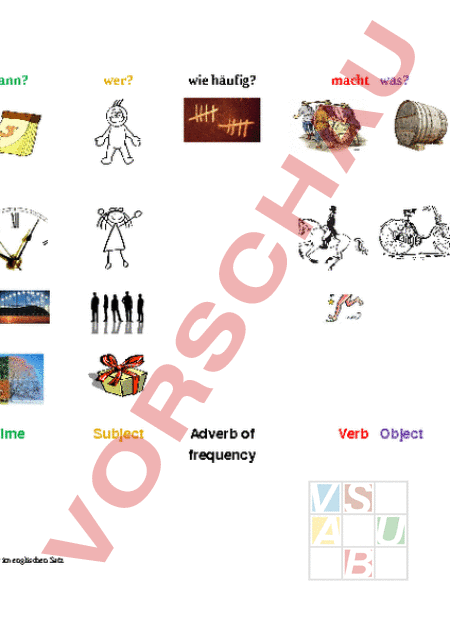Arbeitsblatt: Word Order im englischen Satz
Material-Details
Übersicht zur Word Order mit separaten Übersichten zu den verschiedenen Satzarten
Englisch
Grammatik
7. Schuljahr
5 Seiten
Statistik
91951
1018
3
06.01.2012
Autor/in
Steger Patrick
Land: Schweiz
Registriert vor 2006
Textauszüge aus dem Inhalt:
ms 11 wann? wer? wie häufig? Time Subject Adverb of frequency Word Order im englischen Satz macht was? Verb Object wo? wann? Place Time ms 11 when? how long? how often? who? how often? Mr Connor normally usually does what? where? has lunch at the snackbar have They For two hours my friend Every Saturday Peter play handball is swimming watches TV Expressions of time can be put at the beginning or the end of statement. At the end of the sentence: Place before Time NEVER put Place or Time between Verb and Object 1 Einfacher Satz (statement): wer? Subject Word Order im englischen Satz breakfast macht was? Verb Object play football. when? how long? how often? on Mondays. in the kitchen. in the gym in the pool. at home. every Monday. ms 11 Max reads books. We can speak English. Sue is singing nice song. They are learning the new words. sang another song. We had breakfast. My dad was singer. They were singing song. will be film star. It was raining cats and dogs. play football and like table tennis. 2 Adverbs of frequency always, usually, regularly, normally, often, sometimes, occasionally, rarely, seldom, never are adverbs of frequency. The position of these adverbs is: Word Order im englischen Satz ms 11 after form of to be (am, are, is was, were) wann? wer? ist/war wie häufig? was? wo? wann? Time Subject Verb to be Adverb of frequency Object Place Time when? who? am, are, is/was, were how often? what? where? when? how long? how often? Susan is never late. The dog was often dirty there. before the main verb wann? wer? Time Subject when? who? how often? always Peter Word Order im englischen Satz wie häufig? Auxiliary Verb can Adverb of frequency usually macht was? Main Verb Object does what? get up play football wo? wann? Place Time where? when? how long? how often? at 6.45h. on Sundays. ms 11 On Tuesdays Mandy has sometimes got lots of homework. The adverbs often, usually, sometimes and occasionally can go at the beginning of sentence: Sometimes go swimming. Often we surf the internet. Sometimes these adverbs are put at the end of the sentence: We read books occasionally. 3 Negativer Satz (negativ statement): wer? Subject macht Auxiliary Verb was? Main Verb Object not dont play football. Max doesnt read books. We cant speak English. Sue isnt singing nice song. arent learning their words. They Word Order im englischen Satz ms 11 He hasnt They havent Lilly wont She didnt You couldnt got sister. learned anything. win prize. go to Florence. write to me. It wasnt raining in the south. You werent learning their words. We hadnt learned anything. wouldnt stay in school. 4 Fragesatz (Question) wer? Word Order im englischen Satz macht was? ms 11 Question Word Auxiliary Verb Subject Where do did you play football? When does did Max read books? How often can could they speak English? Why cant couldnt she learn in the evenings? When is was Sue What will would she Who did he How could you Which should it What time were they Word Order im englischen Satz Main Verb Object singing nice song? be in the future? bring this present? say this correctly? be for you? playing the piano?
